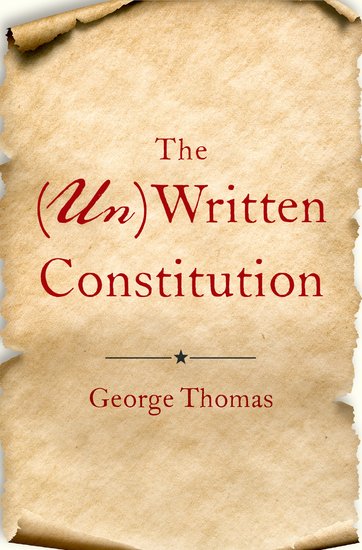Starting Points Journal: “The (Un)Written Constitution”
By George Thomas
‘The use of words is to express ideas . . . But no language is so copious as to supply words and phrases for every complex idea, or so correct as not to include many equivocally denoting different ideas.’ – James Madison, Federalist 37
“Conservative originalists like the late Justice Antonin Scalia relish pointing to departures from constitutional text as departures from the Constitution. Yet Scalia’s originalism relied on unwritten ideas. This is true of all approaches to constitutional interpretation. Many of our most important constitutional debates, contrary to some of our most prominent originalist jurists, are not about whether to follow constitutional text; they are disputes about what fidelity to text requires. And how we read the text inevitably turns on our unwritten understandings.
But this truth is obscured by the public debate around originalism, which is too often framed as either sticking to the text of the Constitution or going beyond it and making things up. My new book, The (Un)Written Constitution (Oxford, 2021), corrects this framing. Drawing from judicial opinions and political practices rather than scholarly disquisition, I focus largely on Supreme Court opinions and the arguments of the justices to make visible the unwritten understandings and ideas that drive textual interpretation. Beyond Supreme Court opinions, I turn to prominent political figures such as James Madison, who had a hand in working out constitutional meaning based on sparse text. In explicating the Constitution, these judicial and political opinions offer us a great debate on the political theory that underlies the written Constitution. Across a range of constitutional disputes—from the separation of powers to the meaning of freedom of speech, from partisan gerrymandering to the reach and limits of Congress’s power to regulate interstate commerce, from racial discrimination to same-sex marriage—The (Un)Written Constitution illuminates the unwritten understandings that inform our disputes about the written Constitution…”
Read the rest of the piece at Starting Points or The Constitutionalist >>
The (Un)Written Constitution
By George Thomas
 The late Justice Scalia relished pointing to departures from the written text of the Constitution as a departure from Constitutional law itself, but in fact his own jurisprudence relied on unwritten ideas. Given that Scalia’s “textualist” approach to constitutional interpretation has become even more prominent in recent years with the elevation of Justices Gorsuch, Kavanaugh, and Barrett–all jurists in the mold of Scalia–to the Supreme Court, it is crucial that the public understands that these textualists all rely on unwritten ideas when they interpret the Constitution. Indeed, our most intense debates about America’s written Constitution are not about constitutional text, but about the unwritten ideas and understandings that guide our reading of the text.
The late Justice Scalia relished pointing to departures from the written text of the Constitution as a departure from Constitutional law itself, but in fact his own jurisprudence relied on unwritten ideas. Given that Scalia’s “textualist” approach to constitutional interpretation has become even more prominent in recent years with the elevation of Justices Gorsuch, Kavanaugh, and Barrett–all jurists in the mold of Scalia–to the Supreme Court, it is crucial that the public understands that these textualists all rely on unwritten ideas when they interpret the Constitution. Indeed, our most intense debates about America’s written Constitution are not about constitutional text, but about the unwritten ideas and understandings that guide our reading of the text.
In The (Un)Written Constitution, George Thomas makes these ideas visible by turning to the practices of Supreme Court justices and political actors in interpreting the Constitution over more than two centuries. From founding debates about freedom of speech and religion to contemporary arguments about judicial review, the separation of powers, same–sex marriage, and partisan gerrymandering, he highlights the too–often unacknowledged ideas that animate our debates about the written Constitution. Contrary to the self-identified textualists, Thomas argues, these recurrent debates are not about whether to follow the text. Rather, they are disputes about what fidelity to the text requires.
Illuminating how moving beyond the text is an inescapable feature of interpreting the written Constitution, this concise primer on constitutional interpretation forces us to consider the text–and the unstated principles that lie beneath it-in a new light.
Order now from Oxford University Press or Amazon >>
 George Thomas is the Burnet C. Wohlford Professor of American Political Institutions at Claremont McKenna College. He is the winner of the American Political Science Association’s 2006 Alexander L. George Award for the Best Article on Qualitative Methods and serves as an officer for the American Political Thought section of APSA. Professor Thomas specializes in the topics of American constitutionalism, American political thought, constitutional law, and the Supreme Court. He has written extensively on the Constitution, the Founders, and the history of American education. Aside from The (Un)Written Constitution, he is the author of The Founders and the Idea of a National University: Constituting the American Mind (Cambridge University Press, 2015), and he has published articles in Perspectives on Politics, Polity, National Affairs, and Critical Review, among others.
George Thomas is the Burnet C. Wohlford Professor of American Political Institutions at Claremont McKenna College. He is the winner of the American Political Science Association’s 2006 Alexander L. George Award for the Best Article on Qualitative Methods and serves as an officer for the American Political Thought section of APSA. Professor Thomas specializes in the topics of American constitutionalism, American political thought, constitutional law, and the Supreme Court. He has written extensively on the Constitution, the Founders, and the history of American education. Aside from The (Un)Written Constitution, he is the author of The Founders and the Idea of a National University: Constituting the American Mind (Cambridge University Press, 2015), and he has published articles in Perspectives on Politics, Polity, National Affairs, and Critical Review, among others.
Professor Thomas is a JMC faculty partner.
Learn more about George Thomas >>
![]()
![]() Follow us on Facebook and Twitter for updates about lectures, publications, podcasts, and events related to American political thought, United States history, and the Western political tradition!
Follow us on Facebook and Twitter for updates about lectures, publications, podcasts, and events related to American political thought, United States history, and the Western political tradition!
Want to help the Jack Miller Center transform higher education? Donate today.
